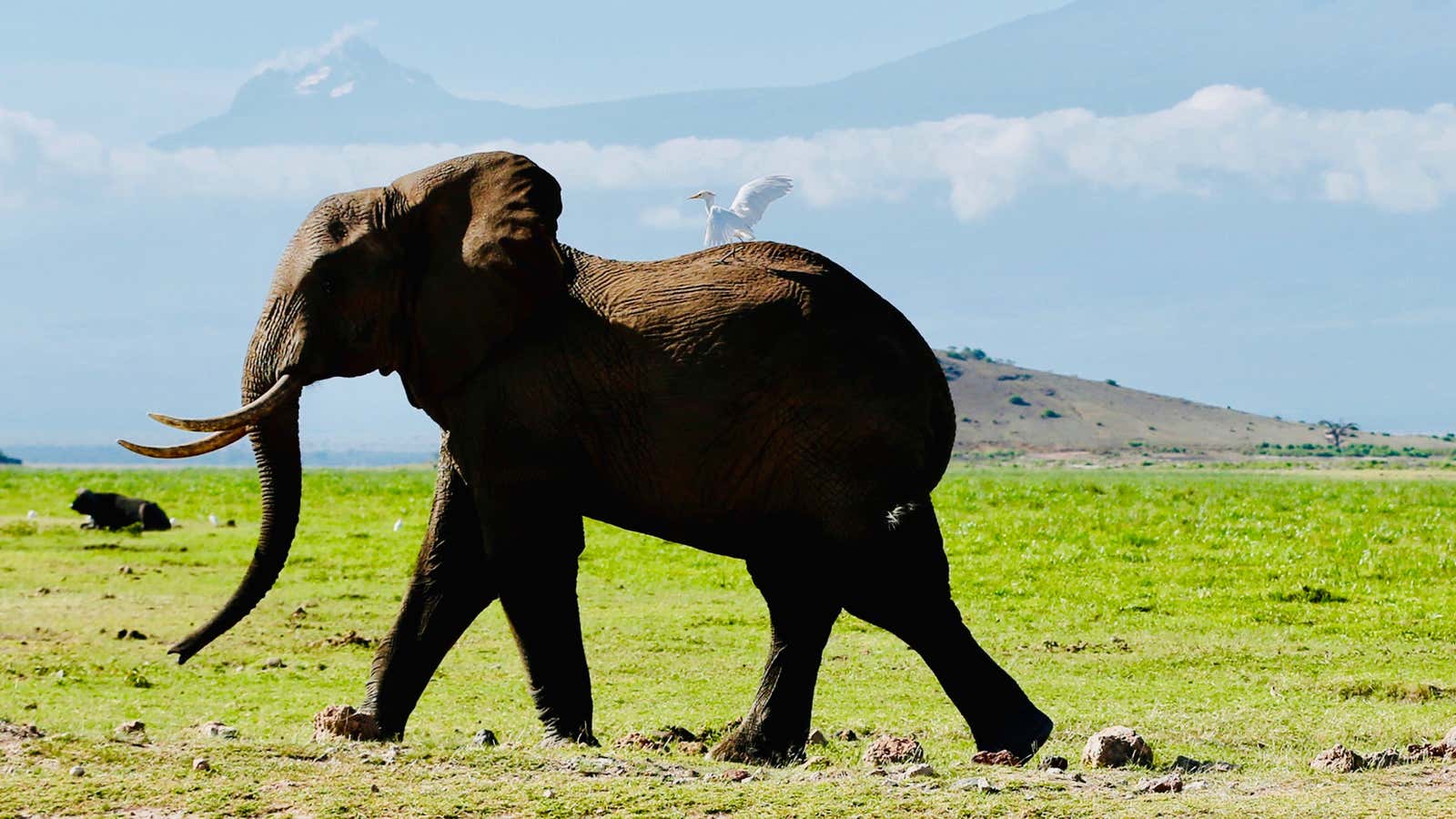Geoff Manchester, co-founder of the Australian sustainable touring company Intrepid Travel, loves elephants—and he wants you to, as well. “There’s a surreal connection when you gaze into an elephant’s eyes,” he told Quartz ahead of World Elephant Day (Aug. 12)
Manchester has spent 30 years visiting with elephants. In that time he’s come to believe that they are highly intelligent, empathetic creatures who are a lot like people, only bigger. About five years ago, however, he realized that the animals he loves were in danger in part due to an activity that his tour company and others were promoting—elephant riding. Intrepid Travel, he said, became the first global tour operator to ban elephant rides, a move that has since prompted 200 other companies worldwide to do the same.
For decades, the most popular tours that Manchester’s company offered promised elephant rides. However, he grew concerned about the ethics of this endeavor. “Southeast Asia was flooding with travelers who wanted to jump on an elephant’s back and have that bucket-list experience,” he said. The interspecies interactions were often portrayed as ethical, fostering a connection between humans and animals, but Manchester worried that elephant-riding’s popularity was actually prompting people to treat them cruelly for economic gain and for the sake of entertaining visitors. “Over time, it became obvious that locals were capitalizing on elephants as attractions, capturing and breaking them to succumb to being ridden.”
In 2010 and 2011, the tour company’s nonprofit arm, the Intrepid Foundation, partnered with World Animal Protection, a global animal conservation nonprofit, to commission a study into elephant conditions in Southeast Asian countries like Thailand, where elephant riding for tourists was widespread. The investigation used impartial animal welfare experts to look into 118 wildlife projects and businesses. What they found was disconcerting. The creatures were separated from their families, broken with hooks and chains, and often left malnourished while being kept captive in difficult conditions in order to delight tourists who would only briefly interact with the animals and knew nothing of their plight. “Elephants were suffering at the expense of travelers,” Manchester said.
Intrepid Travel determined it would become part of a solution instead of compounding the problem. So, in 2014, it banned elephant riding tours and started educating travelers on the ethics of elephant economics. Manchester admits that it was “commercially risky” because the rides were what drew many clients to book tours with his company. But since his clients are interested in sustainable travel—tourism that minimizes harm to the planet and the people and creatures in the places tourists visit—they didn’t resist the change when they were educated about the reasons for it, he said.
In fact, business got better and bookings increased as the company shifted from offering riding tours to visiting with elephants in places where they are protected and can roam free. Now, travelers go to sites like the Elephant Nature Park in Chiang Mai, Thailand, where people can meet the creatures and appreciate their beauty but cannot ride on their backs. Manchester said that visiting the park is one of his favorite travel experiences because every elephant in the park has a name, a unique personality and “a story to tell,” and visitors can bond with the animals without causing any harm.
Still, Manchester isn’t trying to shame anyone who longs to ride an elephant or already has. “You’re not alone if you’ve ever ridden an elephant—I did it in Thailand. Ethical tourism isn’t about reprimanding travelers who have ridden an elephant in the past. Instead, it’s vital that we provide solutions in the present so that travelers respect animals and protect them for future generations.”
An interspecies alliance
In Southeast Asia there has been increasing attention to the plight of elephants in recent years. The animals have long worked with humans, most notably in the logging industry, and there are “mahouts,” or elephant riders and trainers, who have a symbiotic and cooperative relationship with them. Geographer Jacob Shell, author of Giants of the Monsoon Forest—an ode to elephant intelligence and a history of their working relations with people in Asia—argues that Asian elephants “have in effect formed a kind of interspecies alliance with humans.”
Shell warns against outlawing all elephant employment in the name of conservation, pointing out that successful mahouts absolutely must treat their creatures well to get them to return to work, as the elephants roam free to eat and can wander off if they want to. But as the logging industry has changed and jobs for mahouts and elephants have dwindled, local authorities, academics, conservationists, and tour operators like Manchester, have increasingly sought to protect the creatures from exploitation, including in the tourism industry.
Shell suggests that training elephants to be rescue workers—a job they excelled at in World War II—would not only save human lives that are increasingly threatened by extreme weather, but also ensure that the animal survives. Asian elephants are the second largest land species after African elephants. There are only about 40,000 to 50,000 of them remaining on the continent, about a quarter of which work in the logging and transportation industries. While African elephants also face threats, particularly from poachers, there are about 500,000 of them and they are mostly living in the wild.
Like Manchester of Intrepid Travel, Shell is worried about the fate of pachyderms in Asia and supports the creation of more sanctuaries for these intelligent creatures. However, he hopes animal lovers will take a nuanced view of what the beasts need as their future becomes more precarious, concluding, “What I would urge outsiders concerned for Asian elephants to consider is that the desire (an all-too-human desire) to gravitate toward the ‘pure’ or ‘perfect’ positions is not the same thing as Asian elephants’ desire to survive in a human-dominated world.”
